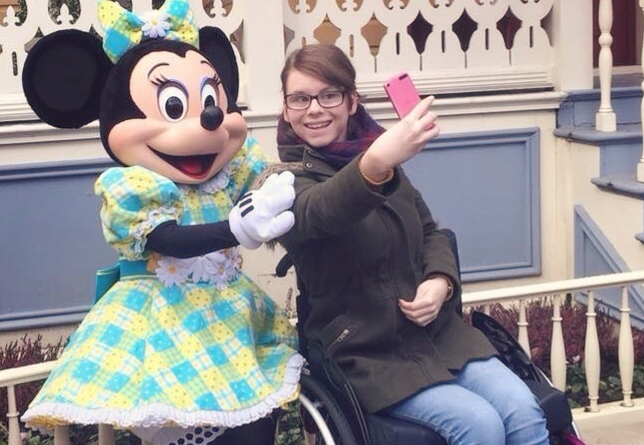6 things a teen with cerebral palsy wants new parents to know
I cannot begin to imagine what it is like to hear the words “your child has cerebral palsy,” because I have always been the one to have CP. It is all I have ever known, but does that have to be a bad thing?

By Chloe Tear, The Mighty May 4, 2016
When your child is diagnosed with cerebral palsy, I imagine you will have thousands upon thousands of questions about your child’s expected progress, abilities / disabilities, meeting milestones and so much more. These questions can’t be answered in any great detail right away — with the vast majority left to the “waiting game.”
You may research CP in the hope of finding these answers, or at least a bit of support in this new unknown world for you and your child. Everything I can tell you is purely based on experience over the last 18 years. Cerebral palsy is unique to everyone and part of quite a large spectrum, but I hope it can at least give you a possible glimpse into the future: highs, lows and everything in between.
| 1. They will surprise you. |
Doctors have a way of erring on the side of caution and making predictions based on little information right from the start. However, people with cerebral palsy are often determined, even a little bit stubborn, to challenge these predictions. I may not have received my CP diagnosis until the age of 7, but being 8 weeks premature made even surviving a matter of fighting the odds. At that moment in time, it would have been impossible to know the next 18 years and all the challenges that have come my way, and also all the victories!
It may have taken longer to walk, run, ride a bike, tell the time… but woe betide anyone who says I cannot do anything. Even if it may take your child longer, that can make it even more special when they get there. Your child will have their own unique milestones and their own victories, no matter how small.
| 2. There will be frustration. |
I would be lying if I were to say it was all plain sailing — but isn’t that the case with everyone? The hospital appointments, the physiotherapy, the urge to fit in with peers — at times, it can be incredibly difficult and I have shed many tears. When I was younger I was such a girly-girl; everything had to be pink and pretty.
Trainers and a splint didn’t really fit the look I was going for — all I wanted was nice pretty shoes. We spent hours in shoe shops, with a few shoes thrown in sheer anger as the “perfect” pair of shoes wouldn’t fit over my newly cast AFO splint. People with CP are resilient, we have to be, but that doesn’t mean it is all progress.
| 3. Family and friends can be a great support. |
The support you can get from friends and family can be fundamental. At the end of the day, we all need a little helping hand — some people just need a little more. Also, I have found that having friendships with other young people who have CP can be incredibly valuable.
When you are having a rough day, the opportunity to share similar experiences and know you are not alone in all of this can help. It can help to talk to adults with CP who’ve already been down the same road. For example, I am planning to attend university, and I have found speaking to other young people who are currently students to be really reassuring.
| 4. They will be amazing at adapting. |
Who says you have to do everything just like everybody else? From personal experience, I know that sometimes it is actually easier to do things in your own way, in order to get the same result as everyone else. This could be mastering tasks with one hand such as tying shoe laces or eating a meal. Adapting is often part of every day, and at times it can be difficult to come up with solutions, but you do get there.
For some people, adapting can include the use of certain equipment in order to gain independence, and from experience I know this can sometimes result in a love-hate relationship. However, it can allow loads more freedom and the ability to achieve much more. It may just take time to adjust to these adaptions.
| 5. Humor will get you through. |
Sometimes you have to laugh, even if it’s just so you don’t cry. Laugh at the fact that you have ended up on the floor… again! Laugh at the fact you did something and might have looked a bit silly. Yes, at times this can be hard, and laughing isn’t always the answer — but it will certainly help. “When you find humor in a difficult situation, you win” — I believe this is so true, and certainly a quote to live by!
| 6. The diagnosis is a very small part of your child. |
Your child is not the diagnosis they have been given. They are not solely the label put on them without permission. First and foremost, they are your child, who happens to have cerebral palsy, just like they happen to have blue eyes or brown hair!
A diagnosis may seem like it is taking over at times, but really it is only one piece of the thousand piece puzzle that makes up a child. Having cerebral palsy can open so many doors and opportunities; it can make your child unique in the best way possible. The diagnosis is what you make of it. Turn those obstacles into opportunities, don’t look back and never ever put a limit on what you can achieve.
Source The Mighty
